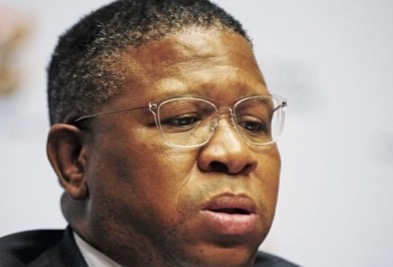Aside from parting ways with Eskom following his interview with eNCA’s Annika Larson, former CEO André De Ruyter has come in for great deal of criticism for the sentiments he expressed.
ANC Secretary General Fikile Mbalula said that he had failed in his responsibility, which was to improve the utility’s performance as a state-owned enterprise.
‘Mr De Ruyter was appointed strictly to lead the turnaround at Eskom into a functional public enterprise that provides the country with stable electricity. He has completely failed to deliver on this contractual obligation,’ he said.
In reference to De Ruyter’s interview, Mbalula said: ‘He shifts the goalposts by advertising his right-wing ideological posture on a matter that falls outside the scope of his employment contract.’
Mbalula added that the ANC had consistently supported De Ruyter and would consider legal action to force De Ruyter to divulge the information he had to back up his corruption allegations.
Minister in the Presidency, Mondli Gungubele, echoed this, calling De Ruyter’s posture ‘right wing’.
Said Gungubele: ‘It is quite disturbing that a man of his stature joins the chorus of allegations whilst he is in a position which makes him a prescribed officer to assist South Africans in dealing with corruption in a more effective way, rather than mere allegations. It is just not correct for an official to send a message which is not verified or authenticated about government, especially in his capacity and in the position that he holds.’
Minister of Public Enterprises Pravin Gordhan said that CEOs of state-owned enterprises ‘should not be involved in open political debates or assertions’. Political views needed to remain private, he said.
Solly Mapaila, General Secretary of the South African Communist Party, also attacked De Ruyter. South Africa, he said, has not learned how to protect its ‘revolution’, and he referred to Cuba as an exemplar in this respect.
‘He goes on to attack our country after what he himself has dismally shown what one would characterise as a spectacular failure in leading Eskom. I think when he came and took office practically Eskom had an energy availability of about 70% – he let it down to where we are and wants to blame others. So that is one of the major lessons that we are learning from the Cubans deploying appropriate cadres, people who understand the task at hand, not people who are deployed to build state capacity, destroy state capacity and then politics’, said Mapaila.
Chair of the Eskom board, Mpho Makwana, said that De Ruyter had put too much emphasis on renewable energy and had neglected the wellbeing of the utility’s coal-fired fleet. De Ruyter had also ‘skilfully avoided’ a performance review by announcing his resignation in December.
The Democratic Alliance said that it would use the Promotion of Access to Information Act to seek information about the corruption to which De Ruyter referred. ‘The purpose of this request’, DA leader John Steenhuisen said, ‘is to obtain all information and evidence at Eskom’s disposal regarding the alleged ANC kingpin behind the systemic corruption that has brought our country’s electricity supply to its knees.’
In addition, concerns were expressed by some that De Ruyter’s departure could signal the end of some anti-corruption initiatives. One instance raised in the media concerned a collaborative operation between law firm Bowmans and the Special Investigating Unit which was aimed at dealing with corruption in the construction of the Kusile Power Station. The contract with the firm is being renegotiated, and it is understood that De Ruyter wished to retain it – in the face of opposition from some within Eskom.

